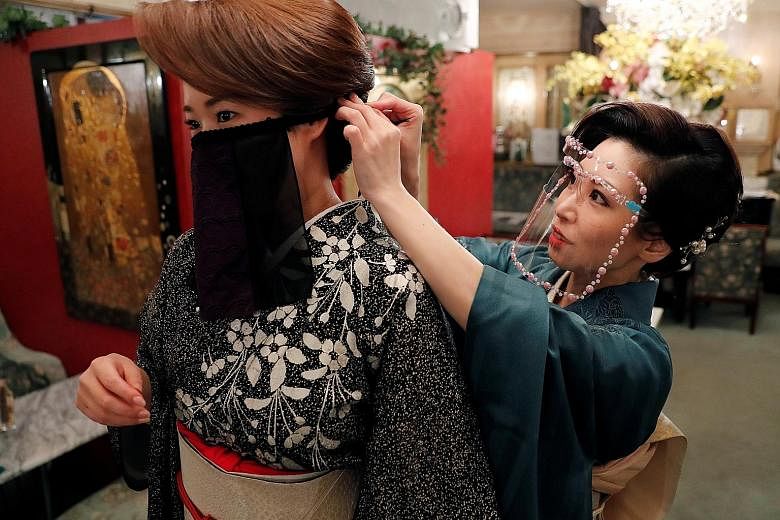Japan logged at least 2,201 Covid-19 cases yesterday in a new daily high, with one-day records in Tokyo, Kanagawa and Saitama that are part of the world's largest metropolitan area by population.
This was a leap from the previous peak of 1,736 cases nationwide, set just last Saturday, and comes as the spread of Covid-19 appears to be gathering pace across Japan.
Fears of a virus resurgence sent Japanese shares lower yesterday, with the Nikkei 225 index shedding 1.1 per cent a day after climbing to its highest level since 1991.
Prime Minister Yoshihide Suga said last night that he was extremely concerned by the rising number of infections. Unlike in the previous wave which comprised mainly youth in nightlife districts, this is now occurring among middle-aged and elderly citizens. Clusters are also appearing across different sectors.
Tokyo recorded 493 cases yesterday, topping the previous peak of 472 set during the height of the second wave on Aug 1.
Tokyo Governor Yuriko Koike is expected to raise the Covid-19 alert level to the highest on the capital's four-tier scale today, following a meeting with medical experts.
While the fine print of what measures this will entail remained to be worked out, Japanese media cited unnamed sources as saying that a reintroduction of guidelines for food and beverage outlets to shut early might be on the table.
Osaka, Nagoya and Sapporo, all of which have seen a spike in infections in recent weeks, have issued guidelines urging those who dine out to cap the party size at four people and the duration at two hours.
Hokkaido raised its Covid-19 alert on Monday and its capital, Sapporo, has advised F&B outlets to shut between 10pm and 5am while asking residents to avoid making non-essential outings.
The latest spike is bad news for the F&B industry, which has been counting on the bumper year-end "bonenkai" or forget-the-year party, season to keep the tills ringing.
When observing this Japanese tradition, friends and colleagues usually gather over copious amounts of food and alcohol to forget the woes of the year gone by.
And in a blow to the government's much touted Go To Travel domestic tourism campaign, travel agencies are reporting cancellations by members of the public who are hesitating to go on vacation, out of either a sense of social responsibility or a fear of infection.
Dr Shigeru Omi, who heads a government panel of medical experts, said yesterday that the government might have to again consider placing limits on social and economic activities.
He warned: "This is the time for everyone to exercise restraint to prevent this from happening."
Japan Medical Association president Toshio Nakagawa urged the public to avoid making non-essential trips during the three-day-long weekend ending next Monday.
Besides Tokyo, also setting new daily records yesterday were Kanagawa to the capital's south, with 226 cases, and Saitama to the north, with 126 cases. Along with Chiba, with 66 cases, they account for about a third of Japan's gross domestic product.
Shizuoka and Nagano, which are popular day-trip destinations from Tokyo, also set new one-day highs of 87 and 30 cases respectively.
Osaka's 273 cases yesterday was its second-highest count, while Hokkaido's 233 cases marked its third-highest one-day tally.
The resurgence is causing alarm, especially in Japan's rural regions where local officials are spooked by the spectre of a potential shortage of hospital beds amid the rising numbers of infections among the middle-aged and elderly.
The spread means the prospect of reopening borders for leisure is fast diminishing.
Olympics Minister Seiko Hashimoto, in recognising the domestic and global spike, told Parliament yesterday that the government is looking at plans to cap the number of foreign spectators at next year's Games.











